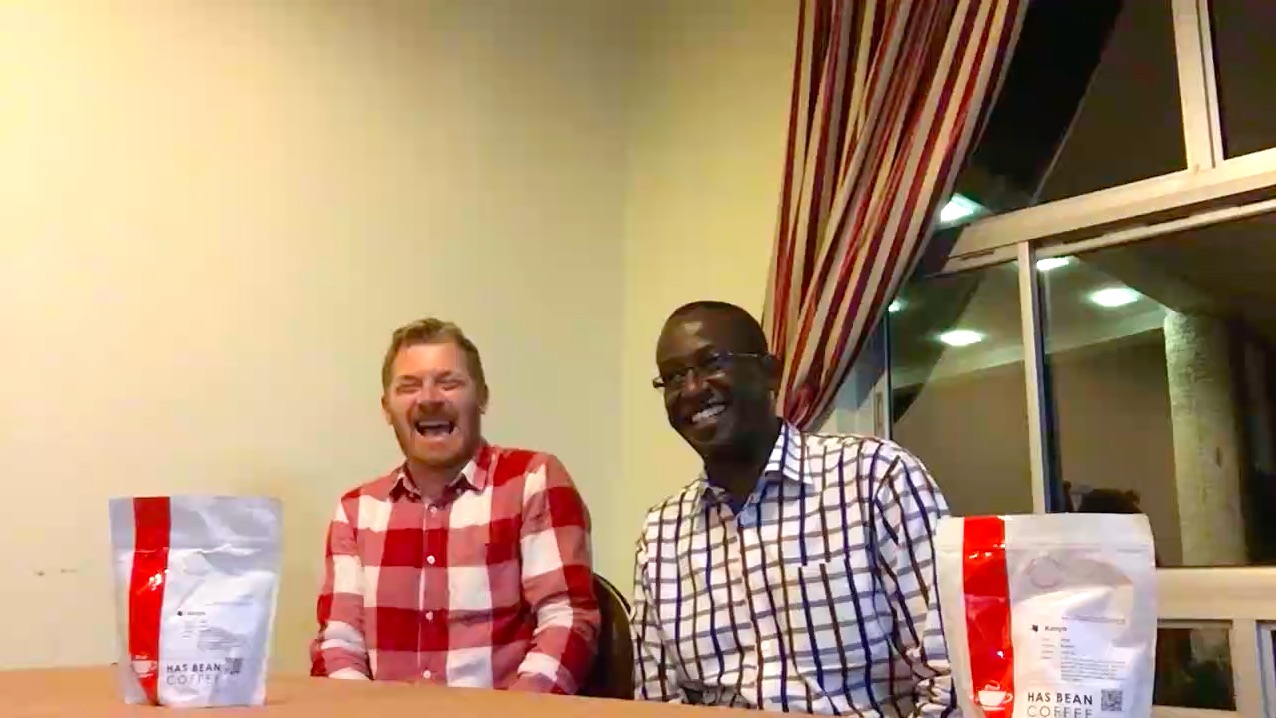
Well hello there, children. Uncle Steve has a story to tell you! So sit back, relax and enjoy the story of the Kiriga coffee estate in Kenya. :)
The first coffee bush at Kiriga estate was planted in approximately 1954 by colonial settlers. At about the same time, less than ten kilometres away along the same Kigio road, a young boy (Aloysius Gakunga, son of the chief for the larger Murang'a county) helped his father – Senior Chief Ndungíu Kagori – plant the first coffee seedling in the area. The area was known as Gaitegi village, Muranga Location 1 (Loco One). A love affair with coffee had been born!
Several years went by and the young boy grew up. He was riding his bicycle along Kigio road and, as he rode past the vast – by now well-established – coffee estates, he promised himself that he would one day own one of them.
He realized this dream in 1976.
Sadly the boy, or Mr. A. N. Gakunga, passed away in July 2014. By the time of his death, Mr. Gakunga had passed on the love of coffee, and the mantle of Kiriga coffee estate, to Dr. Brian Ndungíu Gakunga. Brian was his second child, and the eldest son out of his six children. According to Kikuyu cultural naming systems, Brian is named after Mr. Gakungaís' father, who was both his grandfather and his pioneer coffee farmer.
- Dr. Brian Gakunga is a coffee farmer who is well known in Kenyan coffee circles. He is a founding member and a former long-serving Honorary Secretary of the Kenya Coffee Producers Association, which is a national farmer's organization that works to promote the economic and social interests of the coffee farmers through active participation in the national and international arena.
- Brian is also a former Board Member and Chairman of Transitional Exchange Committee (operationally, he was the then-Chairman of Nairobi Coffee Exchange), where over 90% of all of Kenya's coffee is currently sold. He's also currently the Founding Chairman of Africa Coffee Farmers' Network.
- Africa Coffee Farmers' Network represents the interests of coffee farmers, as spelled out in the organisation's core objective of improving the earnings of poor coffee farmers in order to break the vicious cycle of poverty. One way of doing this is by getting direct sales for the farmers.
The Kiriga coffee estate sits between 1,550 and 1,650 metres above sea level. It is approximately five kilometres from Thika town, which is an industrial town in the central province of Kenya. It's four kilometres from Blue Posts hotel, which has the famous Chania and Thika falls. Thika lies 50 kilometres northeast of Nairobi.
Administratively, Kiriga coffee estate is in the Gatanga constituency of Muranga county, and it's separated from Kiambu county by the Chania river.
Kiriga coffee is Arabica of predominantly SL28 variety (notable for its world-renowned cup quality). The farm has an estimated two hectares of Ruiru 11 variety (which has improved resistance to coffee berry disease and leaf rust); some K7 variety (similar characteristics as SL28, but with better resistance to leaf rust compared to SL28); and a field of the newest Batian variety.
All coffee activities at Kiriga are carried out from the coffee nursery to all the farm operations (pruning, weed control, nutrition, irrigation, basin digging, disease control, infilling, mulching, and planting). Wet mill operations are also carried out on the factory level. Kiriga delivers both parchment coffee and Mbuni (naturals) to the commercial dry mill for milling and grading, in preparation for sale at the coffee auction and in direct sale.
In addition to growing coffee the estate also has, I was told, shoats (sheep and goats), a dairy, and the potential to keep fish. It's all about diversity, and what's more diverse than a 'shoat'?! The estate is also occasionally visited by two hippos, in addition to some bird-life, while also being the home of a family of monkeys.
Kiriga irrigated all its coffee trees – despite the crippling electricity costs involved – during the dry season that happened earlier this year, in order to ensure their high standards were maintained despite the weather.
By the end of last year (2015) the estate changed the cycle of its coffee trees by removing the old heads and growing new heads, which in return gave a higher yield of bold beans with the characteristic 'Kiriga coffee characteristics'. Over 40% of the 'old heads' had to go! This is way above the recommended 25%, and as a result we expect to have decreased yield but increased quality.
At Kiriga they talk about having a 'Kiriga Family'; 30% of the total workforce is made up of resident families who live on the estate, and 50% of those know no other home. The remaining percentage consists of smallholder farmers who commute daily and depend on the estate for survival. There are smallholder farmers who have been part of the family since 1976 and have no desire to work anywhere else, commuting a whopping 10 KM (or more!) daily, past other estates, just to work at Kiriga.
Something really amazing I wanted to tell you about is the Kiriga Welfare Fund. In the past the estate saw its workers get turned away from banks when they tried to acquire loans for dealing with family issues or emergencies. To help his 'Kiriga Family', over the past year Brian has encouraged the workers to set up a welfare group with him as its patron, and Brian has provided money for loaning out to staff according to their most pressing needs.
Brian has also approached a banking institution to see whether they can fund workers to acquire dairy animals on loan and repay from the milk proceeds. Under such an arrangement, 50% of the proceeds would go towards paying for the loan. A market would be readily available and the remaining 50% would be extra income to the workers. This is ongoing and, if successful, it would have the effect of supplementing the workers' wages and greatly improving their quality of life.
During my visit to Kenya last year I was fortunate enough to spend some time chatting with Brian. I even managed to record some of it, too! Make sure to have a listen. :)
Has Blog: An Interview with Brian and Peter from Kiriga (Part 1)
Has Blog: An Interview with Brian and Peter from Kiriga (Part 2)
In the cup you can expect fruit – ALL the fruit! It starts off with blackcurrant and is creamy, smooth and balanced with a fantastic body and structure. Then there's a delicious white grape / green apple acidity, a whopping citrus delight, and a black cherry finish.
- Country: Kenya
- Constituency: Gatanga
- County: Muranga
- Nearest town: Thika
- Estate: Kiriga
- Farmer: Dr. Brian Gakunga
- Altitude: 1,550–1,650 m.a.s.l.
- Varietal: SL28 AA
- Processing method: Washed
Clean Cup: (1–8): 7
Sweetness: (1–8): 7
Acidity: (1–8): 8
Mouthfeel: (1–8): 7
Flavour: (1–8): 7
Aftertaste: (1–8): 7
Balance: (1–8): 7
Overall: (1–8): 8
Correction: (+36): +36
Total: (max 100): 94
More Episodes
 2019-02-08
2019-02-08
 2019-01-05
2019-01-05
 2018-12-22
2018-12-22
 2018-12-21
2018-12-21
 2018-11-24
2018-11-24
 2018-11-17
2018-11-17
 2018-11-03
2018-11-03
 2018-10-13
2018-10-13
 2018-10-06
2018-10-06
Create your
podcast in
minutes
- Full-featured podcast site
- Unlimited storage and bandwidth
- Comprehensive podcast stats
- Distribute to Apple Podcasts, Spotify, and more
- Make money with your podcast
It is Free
- Privacy Policy
- Cookie Policy
- Terms of Use
- Consent Preferences
- Copyright © 2015-2024 Podbean.com






